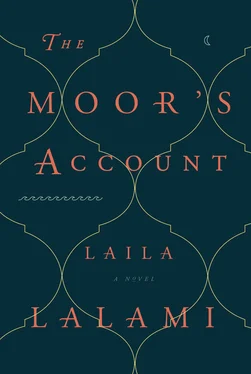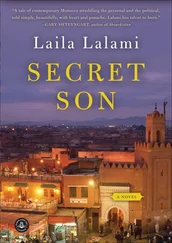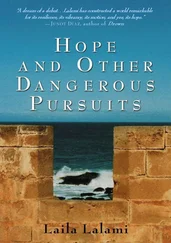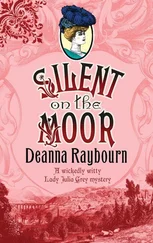Look at him now!
A learned man.
Recite something for us, son.
My father offered our guests cakes and sweets, and danced when the guenbri was played, but a part of him, a part more vibrant and more vital than a limb, seemed to me to be absent, as clearly as if it had been severed by a knife. He remained in this contemplative mood all evening, emerging from it only after everyone had left, and it was to ask me what it was I wanted to do with my life. We were alone — my uncles were walking the fqih home and my mother and aunt were cleaning up in the kitchen. All around us were empty platters, half-filled glasses, and cushions strewn on the floor.
I gave my father the dutiful answer he expected of me. Father, I said, I will do whatever you think is best.
But tell me, my son. What do you wish to do?
His eyes seemed softer now and, encouraged by the kindness in them, I managed to say, Father, I want to be a merchant.
A merchant?
If I had said I wanted to become a hammam attendant or a street musician, he would not have looked more surprised. He stared at me speechlessly. The elders teach us: if you must drown, let it be in a deep well, not in a shallow pond. So I went on, Father, I have always liked the souq. I like watching merchants convince buyers with the yarns they spin, how they persuade someone to buy something he did not know he wanted. And then the offer, the haggling, the resolution: all the give-and-take of a sale. That is what I would enjoy doing.
My son, he said, the life of a notary is a noble one. You practice the law that God and His Messenger have laid down for us and you serve the people of your town. You receive honest earnings that can support a home.
A fine occupation, I said.
But you do not wish to be a notary?
No.
Then why not join your uncles in carpentry?
I have no inclination for carpentry, Father.
My father spoke to me at length that day. He told me that I would do well to choose law or carpentry, that law was the labor of the mind and carpentry the labor of the hands, whereas trade was neither. He warned me that trade would open the door to greed and greed was an inconsiderate guest; it would bring its evil relations with it. I should consider, he said, an occupation for which I would be well prepared by my family and which would honor them. But, just as a deaf man cannot heed a warning to watch out for the horse cart, I would not listen to his appeals. And it seemed he no longer had it in him to compel me. I tried to put some sense into you, he said, but I failed.
So my father asked a friend of his, a notary who often worked with the famous al-Dib family, to introduce me to them. The sons of al-Dib were the most successful merchants in town, being the descendants of refugees from Portugal, and therefore fluent in the country’s language and familiar with its customs. They warehoused the merchandise they purchased from the Christians and sold it to the Muslims in the Dukkala region, or stored the merchandise they bought from the Muslims and sold it to the Christian merchants. In this way, wheat and barley grown in Dukkala was shipped to Portugal, while Azemmur received glass, cotton, and weapons.
Over the next few years, I learned how to preserve wax from the heat and how to parcel it out, how to tell if a roll of linen was from England or from Flanders, how to transport glass from one end of town to the other without breaking it, how to select the kind of woven materials that would sell in Portugal or Spain, how to clean a weapon of its powder so it would look new, and most of all, how to get the best price for any of the goods in which I traded. I learned a lot from my apprenticeship and eventually I became a trusted partner of al-Dib, earning commissions that made me rich. I had a fireplace built in the largest room of our house; I bought fine rugs and silver chests; I paid for Zainab’s wedding.
I felt that I had finally realized my dream, that I had become exactly the sort of man I wanted, a man of means and power, a man whose contracts were recorded by flattering notaries. But as time went on, I fell for the magic of numbers and the allure of profit. I was preoccupied only with the price of things and neglected to consider their value. So long as I managed to sell at a higher price, it no longer mattered to me what it was I sold, whether glass or grain, wax or weapons, or even, I am ashamed to say, especially in consideration of my later fate — slaves.
THE COMMERCE OF HUMAN FLESH came to tempt me one spring morning when I was negotiating the price of seven loads of wheat destined for Lisbon. The farmer selling the grain, a middle-aged man with a narrow face and thin lips that gave the impression of avarice, brought with him three slaves he had unexpectedly inherited from an old uncle. Do you know of a buyer? he asked me, lifting his skullcap and scratching his head. His accent hinted to an upbringing deep in the country, somewhere east of Khenifra.
Why do you want to sell them? I asked.
I know not what else to do with them, he replied. They are too old to be of much use to me on the farm. Still, this one is a good cobbler and the other two can work metal.
The cobbler had small, heavy-lidded eyes that seemed to take no interest in the world they beheld. But the two metalworkers watched me, their eyes pleading silently as I dug my hands inside each bag of wheat to gauge its quality. The sun was in my face. Beads of sweat rolled down my cheeks in a continuous stream. And in my ears was the din of the marketplace: carts creaked, vendors quarreled, water-sellers rang their bells.
The farmer spoke again. How about it? Seventy-five for all three.
I stopped appraising the grain and began to appraise the farmer. Strands of white ran through his beard. He held the strap of his leather satchel with two hands, as if he feared someone might snatch it from him at any moment. Did he really want to sell three skilled slaves for that little? Did he not know how much they were worth? The Portuguese were buying slaves by the hundreds from all their trading posts along the continent, and he could surely sell these three at the port before nightfall. Or he could free them and allow them to return home and live out their lives among their people. I opened my mouth, but instead of an admonition to release these men from bondage, out came a price. Sixty for all three, I said.
From that sale, I derived a profit of one hundred and fifty reais, the most I had made in a single transaction. I was stunned at how easy it had been and how high the proceeds. If I felt any guilt, I quieted it by telling myself that I had not done anything that others had not done before me. The sultan of our kingdom, the governor of our province, and the nobles of our city — they all owned slaves. I ignored the teachings of our Messenger, that all men are brothers, and that there is no difference among them save in the goodness of their actions. With neither care nor deliberation, I consigned these three men to a life of slavery and went to a tavern to celebrate.
MY MOTHER WAS HUDDLED OVER her embroidery when I walked in one summer afternoon. I had spent the day delivering and registering twelve loads of barley to the port, from where they would be shipped to Porto, but I had finished much earlier than I had expected and, rather than spend the evening out, as was often my habit, I had decided to come home. The walk from the port to the house was always pleasant, but at this time of day the streets of Azemmur were still bustling with activity — men sold steamed chickpeas or cooked snails from creaky carts, their voices hoarse from the effort of calling out the price of their wares; women hawked woven baskets or fine linens, holding them before each passerby with one hand, while keeping their haiks in place with the other; children ran to or from the water fountain, bearing pitchers. Then I came across my old teacher. How is your father? he asked me.
Читать дальше












